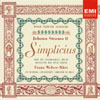Strauss, J II Simplicius
A Johann Strauss rarity given a splendid performance under the idiomatic direction of Franz Welser-Most
View record and artist detailsRecord and Artist Details
Composer or Director: Johann Strauss II
Genre:
Opera
Label: EMI
Magazine Review Date: 11/2000
Media Format: CD or Download
Media Runtime: 118
Mastering:
DDD
Catalogue Number: 557009-2

Tracks:
| Composition | Artist Credit |
|---|---|
| Simplicius |
Johann Strauss II, Composer
Alexander Pereira, Voice Cheyne Davidson, Policeman, Baritone Elizabeth Magnuson, Hildegarde, Soprano Franz Welser-Möst, Conductor Heikki Yrttiaho, Swordbearer Johann Strauss II, Composer Jörg Heppe, An Officer Liliana Nikiteanu, Ebba, a Swedish spy, Soprano Louise Martini, Schnapslotte Martin Zysset, Simplicius, Tenor Martina Janková, Tilly, Soprano Meinholf Kalkuhl, Soldier Michael Volle, Wendelin von Grübben, a hermit, Bass Oliver Widmer, Melchior, Tenor Piotr Beczala, Arnim von Grübben, Tenor Rolf Haunstein, General von Vliessen, Baritone Zurich Opera House Children's Choir Zurich Opera House Chorus Zurich Opera House Orchestra |
Author: Andrew Lamb
Even after the recent release of an Austrian Radio recording of Der lustige Krieg (ORF CD240), Simplicius would not be the Johann Strauss operetta most obviously demanding revival. Despite two major revisions, it achieved no more than 40 performances at the Theater an der Wien between 1887 and 1894. That it was revived in Zurich last October to mark the centenary of Strauss’s death was due primarily to the rediscovery of complete performing material for the revised version in which the operetta was seen outside Vienna.
Based on J J C von Grimmelhausen’s Der abenteuerliche Simplicissimus (‘The adventurous Simplicius’), it tells of the military and amorous adventures of an innocent peasant-boy during the 17th-century Thirty Years War. Its libretto was by the young Victor Leon, future co- librettist of Die lustige Witwe, but Strauss was less than ideally equipped to exploit the satirical opportunities Leon’s book offered. The operetta comes from the period when Strauss was pursuing his serious aspirations, and it immediately preceded his opera Ritter Pasman. The general tone of the music is close to that of Der Zigeunerbaron, but without such rewarding high spots. The best numbers come early in the Third Act – notably the Hermit’s waltz-romance ‘Ich denke gern zuruck’ and the beautiful duet ‘Also, du bist ein Freiersmann?’ for Simplicius and his sweetheart Tilly. The act also contains Armin’s ‘Der Fruhling lacht’, which Marischka and Korngold appropriated for the Duke’s ‘Sei mir gegrusst’ in their revision of Eine Nacht in Venedig. The attractive waltz Donauweibchen, on themes from the operetta, is also added as a ballet in this production.
I can’t pretend this is a lost masterpiece, though it certainly contains some attractive numbers. What cannot be in doubt is the quality of the performance, with Martin Zysset, Piotr Beczala and Michael Volle all giving clear, ringing performances, and Elizabeth Magnuson making her Act 2 entrance-song another highlight. Franz Welser-Most caresses the Viennese rhythms lovingly. We may not get a further opportunity to hear this work, and Strauss admirers and lovers of operatic rarities should seize the opportunity to do so while it’s here.'
Based on J J C von Grimmelhausen’s Der abenteuerliche Simplicissimus (‘The adventurous Simplicius’), it tells of the military and amorous adventures of an innocent peasant-boy during the 17th-century Thirty Years War. Its libretto was by the young Victor Leon, future co- librettist of Die lustige Witwe, but Strauss was less than ideally equipped to exploit the satirical opportunities Leon’s book offered. The operetta comes from the period when Strauss was pursuing his serious aspirations, and it immediately preceded his opera Ritter Pasman. The general tone of the music is close to that of Der Zigeunerbaron, but without such rewarding high spots. The best numbers come early in the Third Act – notably the Hermit’s waltz-romance ‘Ich denke gern zuruck’ and the beautiful duet ‘Also, du bist ein Freiersmann?’ for Simplicius and his sweetheart Tilly. The act also contains Armin’s ‘Der Fruhling lacht’, which Marischka and Korngold appropriated for the Duke’s ‘Sei mir gegrusst’ in their revision of Eine Nacht in Venedig. The attractive waltz Donauweibchen, on themes from the operetta, is also added as a ballet in this production.
I can’t pretend this is a lost masterpiece, though it certainly contains some attractive numbers. What cannot be in doubt is the quality of the performance, with Martin Zysset, Piotr Beczala and Michael Volle all giving clear, ringing performances, and Elizabeth Magnuson making her Act 2 entrance-song another highlight. Franz Welser-Most caresses the Viennese rhythms lovingly. We may not get a further opportunity to hear this work, and Strauss admirers and lovers of operatic rarities should seize the opportunity to do so while it’s here.'
Discover the world's largest classical music catalogue with Presto Music.

Gramophone Digital Club
- Digital Edition
- Digital Archive
- Reviews Database
- Full website access
From £8.75 / month
Subscribe
Gramophone Full Club
- Print Edition
- Digital Edition
- Digital Archive
- Reviews Database
- Full website access
From £11.00 / month
Subscribe
If you are a library, university or other organisation that would be interested in an institutional subscription to Gramophone please click here for further information.




